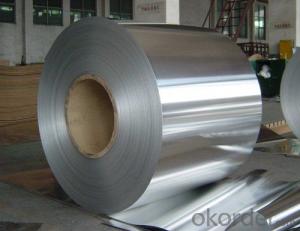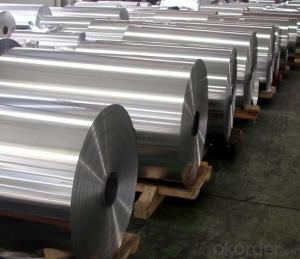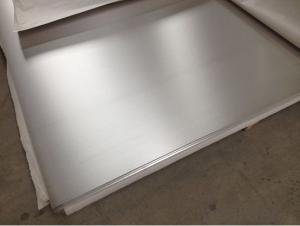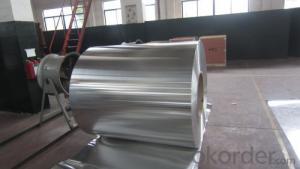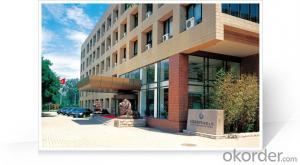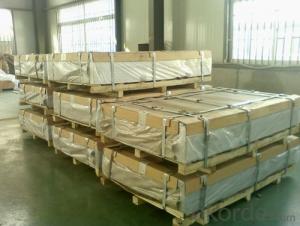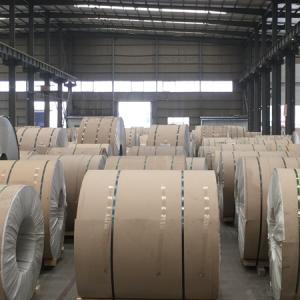Flat Rolled Aluminum Coil Windsor - 1050 1100 3003 5052 5754 5083 6061 7075 H24 Metal Alloy Aluminum Sheet
- Loading Port:
- Shanghai
- Payment Terms:
- TT OR LC
- Min Order Qty:
- 2 m.t.
- Supply Capability:
- 6000 m.t./month
OKorder Service Pledge
OKorder Financial Service
You Might Also Like
Specification
1050 1100 3003 5052 5754 5083 6061 7075 H24 Metal Alloy Aluminum Sheet
Packaging & Delivery
Name | 3003 Aluminum Coil |
ALloy or Not | Yes |
Alloy | 1100H-18, 3003-H24,3003-H26,3005-H26,8011,3004,3105,5005,etc. |
Thickness | 0.1~1.5mm |
Width | <2000mm< span=""> |
MOQ | 1 MT |
Coating finish | Brushed, drawing, embossed, printing |
Color | As to code RAL |
Surface | Embossed,Mill Finish,Coated,Brushed |
Gloss | 10-90%(EN ISO-2813:1994) |
Total coating thick | PVDF27 ~35micron |
Polyester18~27micron(EN ISO-2360:1995) | |
Coating hardness | 2H |
Adhesion | 5B (EN ISO-2409:1994) |
Impact resistance | No cracking and peeling (A.S.T.M D2794-1993) |
Flexibility (T-bend) | 0T- 2T |
MEK resistance | 100 |
Certification | ISO9001:2000, CE, SGS |
Coil's standard diameter | 1100mm |
Inner Diameter | 405mm/505mm |
Coil's standard weight | 1MT - 2MT |
Product Specification | |
Grade | 1000 Series: 1050 1060 1100 3000 Series: 3003 3004 3105 5000 Series: 5052 5605,5083 6000 Series: 6061 6063 8000 Series: 8011 8021 8079 |
Thickness | 0.20-8.00mm |
Width | 2400mm max. |
Grade | 1000,3000,5000,6000,8000series |
Coil ID | 75mm, 150mm, 200mm, 300mm, 400mm, 508mm or negotiable |
Coil weight | 1000-5000kgs |
Coil OD | 1700mm max. |
Temper | O, H12, H14, H16, H111, H22 ,H24, H26, H28,T4, T6,etc. |
Chemical Composition | |||||||||
| Grade | Si | Fe | Cu | Mn | Mg | Cr | Ni | Zn | Al |
| 1050 | 0.25 | 0.4 | 0.05 | 0.05 | 0.05 | - | - | 0.05 | 99.5 |
| 1060 | 0.25 | 0.35 | 0.05 | 0.03 | 0.03 | - | - | 0.05 | 99.6 |
| 1070 | 0.2 | 0.25 | 0.04 | 0.03 | 0.03 | - | - | 0.04 | 99.7 |
| 1100 | Si+Fe:0.95 | 0.05-0.2 | 0.05 | - | - | 0.1 | - | 99 | |
| 1200 | Si+Fe:1.00 | 0.05 | 0.05 | - | - | 0.1 | 0.05 | 99 | |
| 1235 | Si+Fe:0.65 | 0.05 | 0.05 | 0.05 | - | 0.1 | 0.06 | 99.35 | |
| 3003 | 0.6 | 0.7 | 0.05-0.2 | 1.0-1.5 | - | - | - | 0.1 | remains |
| 3004 | 0.3 | 0.7 | 0.25 | 1.0-1.5 | 0.8-1.3 | - | - | 0.25 | remains |
| 3005 | 0.6 | 0.7 | 0.25 | 1.0-1.5 | 0.20-0.6 | 0.1 | - | 0.25 | remains |
| 3105 | 0.6 | 0.7 | 0.3 | 0.30-0.8 | 0.20-0.8 | 0.2 | - | 0.4 | remains |
| 3A21 | 0.6 | 0.7 | 0.2 | 1.0-1.6 | 0.05 | - | - | 0.1 | remains |
| 5005 | 0.3 | 0.7 | 0.2 | 0.2 | 0.50-1.1 | 0.1 | - | 0.25 | remains |
| 5052 | 0.25 | 0.4 | 0.1 | 0.1 | 2.2-2.8 | 0.15-0.35 | - | 0.1 | remains |
| 5083 | 0.4 | 0.4 | 0.1 | 0.40-1.0 | 4.0-4.9 | 0.05-0.25 | - | 0.25 | remains |
| 5154 | 0.25 | 0.4 | 0.1 | 0.1 | 3.1-3.9 | 0.15-0.35 | - | 0.2 | remains |
| 5182 | 0.2 | 0.35 | 0.15 | 0.20-0.50 | 4.0-5.0 | 0.1 | - | 0.25 | remains |
| 5251 | 0.4 | 0.5 | 0.15 | 0.1-0.5 | 1.7-2.4 | 0.15 | - | 0.15 | remains |
| 5754 | 0.4 | 0.4 | 0.1 | 0.5 | 2.6-3.6 | 0.3 | - | 0.2 | remains |
| 6061 | 0.40-0.8 | 0.7 | 0.15-0.40 | 0.15 | 0.8-1.2 | 0.04-0.35 | - | 0.25 | remains |
| 6063 | 0.20-0.6 | 0.35 | 0.1 | 0.1 | 0.45-0.9 | 0.1 | - | 0.1 | remains |
| 6082 | 0.7-1.3 | 0.5 | 0.1 | 0.40-1.0 | 0.6-1.2 | 0.25 | - | 0.2 | remains |
| 6A02 | 0.50-1.2 | 0.5 | 0.20-0.6 | Or Cr0.15-0.35 | 0.45-0.9 | - | - | 0.2 | remains |
| 8011 | 0.50-0.9 | 0.6-1.0 | 0.1 | 0.2 | 0.05 | 0.05 | - | 0.1 | remains |
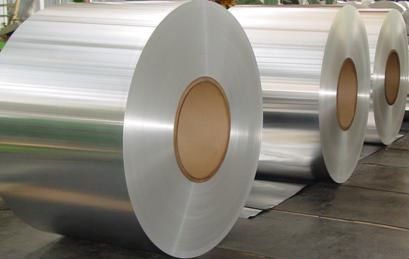
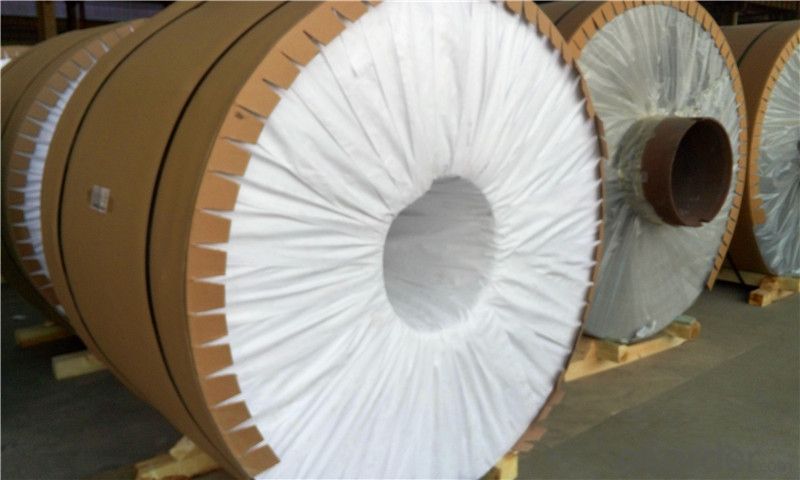
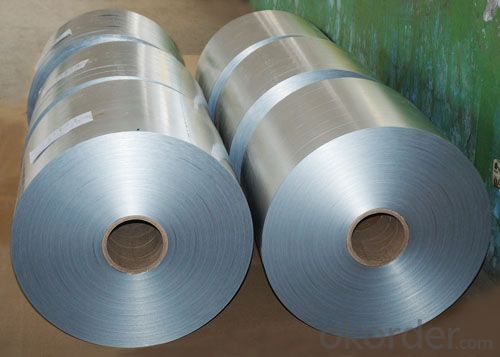
- Q: What are the typical applications of aluminum coils in the automotive industry?
- Aluminum coils are commonly used in the automotive industry for various applications. They are primarily used in the manufacturing of heat exchangers, such as radiators and condensers, due to their excellent thermal conductivity. Additionally, aluminum coils are utilized in the production of car body panels, as they are lightweight and offer high strength-to-weight ratio, contributing to improved fuel efficiency. Moreover, they are also employed in the production of air conditioning systems, wiring harnesses, and electrical components due to their corrosion resistance and electrical conductivity properties.
- Q: Can aluminum coils be customized in terms of thickness?
- Aluminum coils can indeed undergo customization in terms of thickness. The specific requirements of a particular application can determine the adjustment of aluminum coils' thickness. This customization is attained through the process of aluminum coil slitting, which involves cutting the original coil into narrower coils of the desired thickness. This method enables the flexibility to meet a range of needs and specifications across diverse industries.
- Q: How are aluminum coils protected against UV degradation?
- Aluminum coils are protected against UV degradation through the application of a protective coating or finish. This coating acts as a barrier, shielding the coils from the damaging effects of UV radiation, preventing discoloration, corrosion, and other forms of degradation caused by prolonged exposure to sunlight.
- Q: What is the structure of Aluminium Chloride at 180, 192.4 (melting point) and 200 degrees celsius? When does it exist as an ionic lattice and when as a Al2Cl6 dimer?
- Aluminium chloride sublimes (turns straight from a solid to a gas) at about 180°C. If it simply contained ions it would have a very high melting and boiling point because of the strong attractions between the positive and negative ions. The implication is that it when it sublimes at this relatively low temperature, it must be covalent. The dots-and-crosses diagram shows only the outer electrons. Hope that help Check here for more information; www.chemguide .uk/atoms/bonding...
- Q: Are aluminum coils suitable for marine applications?
- Yes, aluminum coils are suitable for marine applications. Aluminum is a corrosion-resistant material, making it an excellent choice for use in marine environments where exposure to saltwater and other corrosive elements is common. Aluminum coils are lightweight, durable, and have high strength-to-weight ratio, which is important for marine applications where weight reduction is desired. Additionally, aluminum coils can withstand extreme temperatures and have good thermal conductivity, making them suitable for various marine heating and cooling systems. Overall, aluminum coils are a popular choice in marine applications due to their corrosion resistance, durability, and lightweight properties.
- Q: I HEARD THAT ALUMINUM POWDER TIGHTEN YOUR VAGINA BUT WHERE DO I BUY IT AND HAVE ANY ONE HEARD OF BEYDARY PILLS, I HEARD THEY TIGHTEN YOUR VAGINA ALSO AND WHERE CAN I BUY THEM
- It's not aluminum powder; it's ALUM powder, which is a different chemical. However, it doesn't really tighten your vagina, despite what some ads will say. I have not heard of beydary pills, but I also doubt that they would do anything to fix the problem either. If a real vaginal shrinking pill was available, it would be well-known and very popular, just like viagra is. Your best bet is to do kegel exercises to strengthen and tone your vaginal muscles. These, and nothing else, can help make your vagina tighter.
- Q: Is it possible to utilize an electric iron that features an aluminum coil heater?
- <p>Yes, you can use an electric iron with an aluminum coil heater. Aluminum coil heaters are commonly used in electric irons due to their excellent heat conductivity and quick heat-up time. They distribute heat evenly and maintain a consistent temperature, making them ideal for ironing. However, it's important to follow the manufacturer's guidelines for use and maintenance to ensure safety and longevity of the iron.</p>
- Q: How are aluminum coils manufactured?
- Aluminum coil rolling is the process used to manufacture aluminum coils, which come in various sizes and thicknesses. To begin, aluminum smelting extracts and refines raw aluminum ore into aluminum ingots. These ingots are then heated to a specific temperature, making them malleable for the rolling process. Next, the heated aluminum ingots undergo hot rolling. They are passed through a series of rolling mills that gradually reduce their thickness and increase their length. Multiple rollers are used to achieve the desired thickness and shape, improving the mechanical properties and surface finish of the aluminum. After hot rolling, the aluminum coils go through cold rolling. This further reduces their thickness using cold rolling mills. Cold rolling enhances the dimensional accuracy, surface finish, and mechanical properties of the aluminum, while also increasing its strength and hardness. Once the desired thickness is achieved, the aluminum coils may undergo additional processes like annealing or tempering. Annealing involves heating the coils and slowly cooling them to relieve internal stresses and improve their ductility. Tempering, on the other hand, requires reheating the coils to a specific temperature before rapidly cooling them to enhance their strength and hardness. After these processes, the aluminum coils undergo quality control inspections. They are checked for defects, such as surface imperfections or thickness variations, and any necessary corrections are made. Finally, the aluminum coils are cut into smaller sizes and packaged for distribution to various industries. These coils are used in the manufacturing of automobiles, appliances, construction materials, and packaging. In summary, the manufacturing process of aluminum coils involves smelting, hot rolling, cold rolling, annealing, tempering, and quality control checks. These steps ensure that the aluminum coils meet the required specifications in terms of thickness, strength, and surface finish.
- Q: How do aluminum coils compare to galvanized steel coils in terms of longevity?
- Aluminum coils generally have a longer lifespan compared to galvanized steel coils. This is because aluminum is naturally corrosion-resistant, providing better protection against rust and other environmental factors. Additionally, aluminum coils are less prone to damage caused by scratches or dents, further contributing to their longevity. However, the specific lifespan of both types of coils can vary depending on the quality of materials used and the maintenance practices followed.
- Q: Is it appropriate to use a hammer to open or unroll an aluminum coil?
- <p>Using a hammer to open an aluminum coil is not recommended. Hammers are designed for striking and can easily damage the aluminum, causing dents or deformation. Instead, use a pry bar or a similar tool to gently unroll the coil without applying excessive force. This will help prevent damage to the aluminum and ensure it remains in good condition for further use.</p>
Send your message to us
Flat Rolled Aluminum Coil Windsor - 1050 1100 3003 5052 5754 5083 6061 7075 H24 Metal Alloy Aluminum Sheet
- Loading Port:
- Shanghai
- Payment Terms:
- TT OR LC
- Min Order Qty:
- 2 m.t.
- Supply Capability:
- 6000 m.t./month
OKorder Service Pledge
OKorder Financial Service
Similar products
Hot products
Hot Searches
Related keywords
